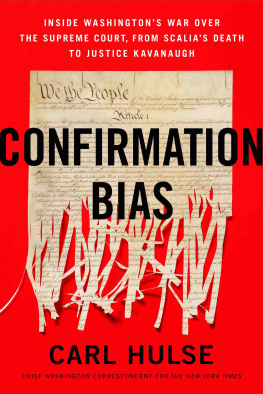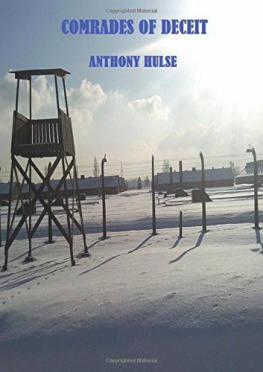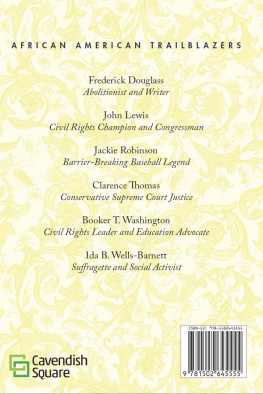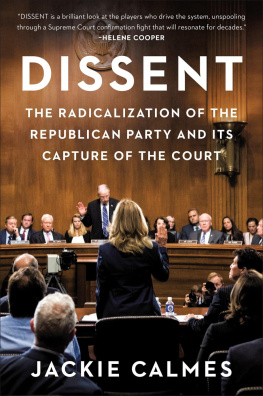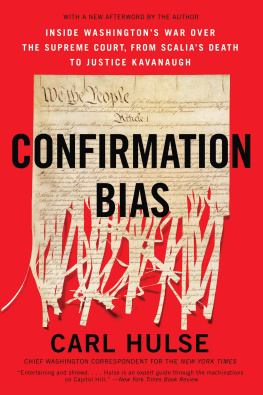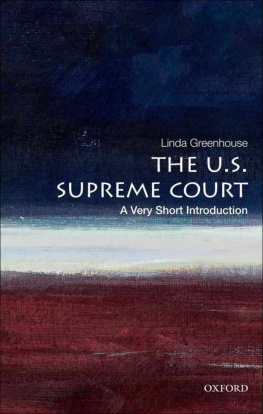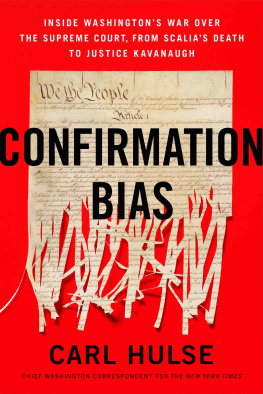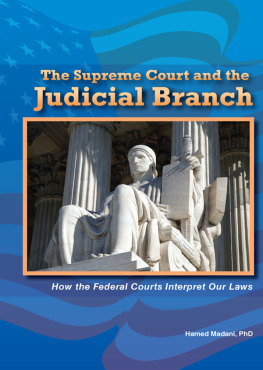It is not easy to conceive a plan better calculated than this to promote a judicious choice of men for filling the offices of the Union.
O N J ANUARY 5, 2017, two weeks before Donald J. Trump would be sworn in following his astonishing election as president, a select group of the incoming administrations most senior officials gathered in a secure room in the presidential transition headquarters in an office building not far from the White House Trump would soon occupy. They were casually going about their business to avoid attracting too much attention.
On hand were the vice president elect, Mike Pence, and his counsel Mark Paoletta; Trumps strategist Steve Bannon; the incoming chief of staff, Reince Priebus; and the incoming White House counsel, Donald F. McGahn II. They would spend much of that day interviewing the finalists for a Supreme Court vacancy that had been instrumental in Trumps victory over Hillary Clinton, an outcome few saw coming. It was time to cash in on that stunning win and fill the empty seat as quickly as possible once the administration took office on January 20.
The court opening had given conservative Christian voters and other skeptical Republicans a reason to back Trump despite his well-documented character flaws and their own doubts about him. With the seat in mind, they had sent to the White House an inexperienced and unpredictable man whom most of the country and world knew as a brash reality television celebrity. Now his presidency was about to become a reality, and the Supreme Court would be among the first institutions to feel the impact.
Picking a Supreme Court nominee is usually a complicated, time-consuming process that involves a close review of the nominees record and writings, along with background checks, interviews, consultations with advocacy groups, and intense internal debate. But the Trump team had been weighing this vacancy for some timethe seat had been open for nearly a year because of an extraordinary campaign mounted by Senate Republicans, led by Mitch McConnell, the majority leader, to prevent President Barack Obama from placing his own nominee, Merrick Garland, on the court.
Whats more, in May 2016 candidate Trump had taken the unprecedented step of disclosing a list of his potential Supreme Court nominees and then pledged to choose from only that list. It was another first in a campaign full of them. So the Trump insiders already had a good idea of whom they would recommend to the new president.
Five top-tier conservative judges were interviewed that day. But as the final candidate entered the room, everyone present was nearly certain that they were about to question the next justice of the US Supreme Court, Neil M. Gorsuch, age forty-nine, a federal appeals court judge in Colorado. To them, he had emerged as the right man to fill the seatif not the shoesof the revered Antonin G. Scalia, the justice whose death in early 2016 had touched off the whole political drama.
What not everyone in that nondescript room knew was that a few of them saw this as the initial step in filling not one Supreme Court seat, but two. They believed that Justice Anthony M. Kennedy, the eighty-year-old swing vote on the court, could soon be encouraged to step down, creating a second vacancy. McGahn was among them, and he had already made up his mind about the pick for the Kennedy opening and confided in Bannon. It would be Brett M. Kavanaugh, fifty-one, a member of the highly influential US Court of Appeals for the District of Columbia Circuit and a fixture in Washingtons Republican political and legal circles. It was Gorsuch and Kavanaugh, back-to-back, one top Trump official at the meeting remembered. The play was called.
McGahn had the clout with Trump to make it happen. His work for Trump and his handling of the campaigns judicial list, which had shored up conservative support and acclaim for Trump, gave the incoming president tremendous confidence in McGahn and earned him wide latitude when it came to judges.
Others would be evaluated and interviewed, their names circulated in media leaks. During the screening, someone else might conceivably rise to the top and supplant Gorsuch or Kavanaugh. Trump would have the final say on his picksthough he was certain to be heavily swayed by the recommendations of McGahn and Leonard Leo, the executive vice president of the Federalist Society, an influential organization of conservative lawyers. Leo was a major force in conservative judicial politics and had helped McGahn with compiling Trumps judicial list during the campaign.
But McGahn knew whom he favored, and his motivation was clear. Gorsuch and Kavanaugh were known for writing powerful opinions aimed at diluting the influence of government bureaucratsthe administrative state, as it is derisively known to conservatives like McGahn, Leo, and Bannon. In elite conservative legal circles, the two judges were considered thought leaders for interpreting the law as a means to strip power from the state.
McGahn himself was an unusual mix of conventional Washington Republican and formerly long-haired radical libertarian who was an excellent guitar player in a beach bar cover band on the side. He may have been a card-carrying conservative, but he still carried a musicians union card. His selection as White House counsel had thrust him into a rarified legal world.
Obsessed with the composition of the federal courts, he would now have tremendous authority over the selection and confirmation of judicial nomineesand not just for the Supreme Court. In negotiating his agreement to join the Trump administration, McGahn had won unparalleled power from Trump to select nominees for the federal bench.
Inflamed and inspired by the fight over Robert Borks nomination to the high court in 1987, McGahn had received law degrees at Widener University and Georgetown after doing his undergraduate work at Notre Dame. He had been a campaign finance attorney, working for the National Republican Congressional Committee and a host of name-brand conservative clients. He was eventually nominated to the Federal Election Commission by President George W. Bush and was confirmed by the Senate with an eager assist from Senator Mitch McConnell, the Republican leader and longtime foe of campaign finance restrictions.
After his Senate confirmation in 2008, he was sworn in by a former Bush administration operative sitting on the US Court of Appeals for the District of Columbia CircuitBrett M. Kavanaugh. McGahn still had the picture taken in Kavanaughs chambers after the swearing-in stored with his memorabilia at home. That guys going to be on the Supreme Court someday, he told Shannon Flaherty, his future wife, as they left the ceremony.
As chairman of the FEC, McGahn set out to weaken the regulatory role of the agency, just as McConnell had counted on. McGahn was considered a holy terror there by Democrats and campaign finance watchdogs. By persuading the other two Republican appointees to consistently vote with him, he brought the FECs work to a halt and sought to disrupt the agency and limit its investigatory power. He left the agency in 2013 to join a private practice.
In late 2014, McGahn began casting about for a Republican presidential campaign to join. He was steered to Trump by his friend David Bossie, head of the Citizens United group, whose landmark Supreme Court victory in 2010 had helped usher in the era of dark campaign money. As he assessed the political landscape, McGahn liked the idea of an unconventional candidate like Trump, calculating that a run-of-the-mill Republican would not be able to upend Hillary Clinton. Bossie smoothed an introduction, and Trump and McGahn hit it off. At the end of their get-acquainted session at Trump Tower, Trump made his usual offer to pose for a photo. McGahn declined, a rare refusal for what Trump considered a coveted keepsake.

